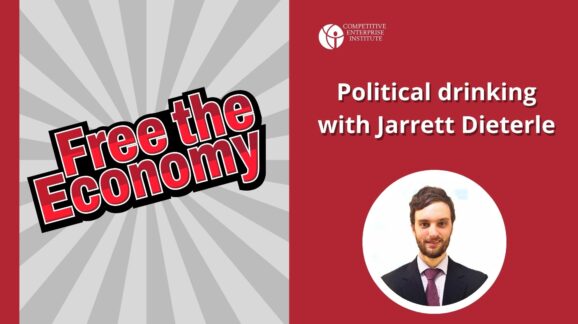There are two main areas in which Congress can enact meaningful reform. The first is to rein in regulatory guidance documents, which we refer to as “regulatory dark matter,” whereby agencies regulate through Federal Register notices, guidance documents, and other means outside standard rulemaking procedure. The second is to enact a series of reforms to increase agency transparency and accountability of all regulation and guidance. These include annual regulatory report cards for rulemaking agencies and regulatory cost estimates from the Office of Management and Budget for more than just a small subset of rules.
In 2019, President Trump signed two executive orders aimed at stopping the practice of agencies using guidance documents to effectively implement policy without going through the legally required notice and comment process.
Featured Posts

Blog
Free the Economy podcast: Political drinking with Jarrett Dieterle
In this week’s episode we cover student loans, revenue from tariffs, democracy in Hong Kong, and the impact of podcasts…

Blog
From cuts to costs: Why federal paperwork keeps piling up
The Office of Management and Budget’s (OMB) release of the 2023 Information Collection Budget (ICB) paints a troubling picture of not just of growing federal…

Blog
This week in ridiculous regulations: Mergers and mail
The 2024 Federal Register topped 90,000 pages and is now the second-longest ever, dating back to 1936, with more than a month still to go.
Search Posts
Blog
Ten Thousand Commandments 2023 is out now
The 2023 edition of CEI’s flagship annual study, Wayne Crews’s Ten Thousand Commandments, is out now. For those not familiar, 10KC gives a big-picture…
News Release
Report: Federal regulatory burden undermines economy, financial security
A new report from the Competitive Enterprise Institute tallies the huge and growing cost federal regulations impose on American businesses and families – $1.939…
Products
Chapter 5: Page Counts and Numbers of Rules in the Federal Register
The Federal Register is the daily repository of all proposed and final federal rules and regulations. Although its number of pages is often cited as…
Products
Chapter 3: Getting Beyond a Federal Regulatory Budget and the Limitations of Administrative Reform
Federal programs are funded either by taxes or by borrowing, with interest, from future tax collections. When Congress spends, no one questions that disclosure…
Products
Chapter 6: The Expanding Code of Federal Regulations
The page count in the Code of Federal Regulations (CFR), where the Register’s rules come to rest in small print, is not as dramatic…
Products
Chapter 9: A Note on Rule Reviews at OMB’s Office of Information and Regulatory Affairs
Tracking the effects of rules and regulations, executive orders, memoranda, and regulatory guidance is vital. These alternative regulatory actions have become powerful means of working…
Staff & Scholars

Clyde Wayne Crews
Fred L. Smith Fellow in Regulatory Studies
- Business and Government
- Consumer Freedom
- Deregulation

Ryan Young
Senior Economist
- Antitrust
- Business and Government
- Regulatory Reform

Fred L. Smith, Jr.
Founder; Chairman Emeritus
- Automobiles and Roads
- Aviation
- Business and Government

Sam Kazman
Counsel Emeritus
- Antitrust
- Automobiles and Roads
- Banking and Finance

Marlo Lewis, Jr.
Senior Fellow
- Climate
- Energy
- Energy and Environment